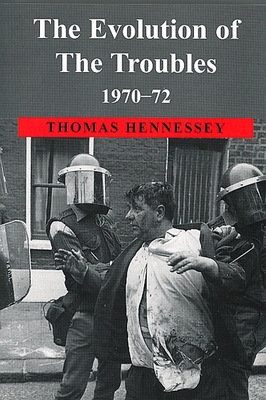The Evolution of the Troubles
Roy Johnston reviews The Evolution of the Troubles 1970-72 by Thomas Hennessey, Irish Academic Press 2007, ISBN 978 0 7165 2885 2, £18.95/€24.95 pbk

HENNESSEY'S THE Evolution of The Troubles is a sequel to an earlier book by the same author, which I reviewed somewhat critically; I felt he had depended too much on the British establishment records, and on the unionist media. This sequel comes over as somewhat more balanced and objective.
It begins with a detailed account of the beginnings of the Provisional campaign, up to the end of July 1970. His main source as previously is the British archive, and in the context Sir Burke Trend emerges as an interesting possible successor to his predecessor as Cabinet Secretary Tom Jones, who served Lloyd George. Other sources include Peter Taylor, Raymond Quinn and Sean Mac Stiofain. He also makes use of the Bew-Gillespie chronology.
The second chapter 'August 1970 to March 1971' covers some of the details of the Official-Provisional feud which developed; it ends with the resignation of Chichester-Clarke, whose phone conversation with Heath is included. His sources apart from the British archive are mostly the Irish News and the Irish Times.
The third chapter, March to August 1971, gives a blow by blow account of the Faulkner regime in the period leading up to internment. The emergence of Hume and the SDLP is treated, as are the interactions with the Dunlin government. The attempt madeby the Officials to revive te political path is noted, despite the threat of losing their membership to the Provisionals at the grass-roots. Sources, apart from the British archive, Irish Times, Irish News and the Belfast Newsletter, include Henry Kelly 'How Stormont Fell'.
The following chapter deals with the details of the internment process and its immediate consequences; we get the phone conversation between Heath and Lynch, and an indication of the obsolescence of the internment hit-list, resulting in substantial Provisional recruitment and considerable violence, along with total alienation of the Catholic population and the setting up an alternative assembly, with the withdrawal of nationalist and labour politicians from Stormont and local government.
This is followed by a chapter on 'deep' interrogation, as described in the Compton Report, generating European condemnation; it seems Heath at the time was unrepentant.
In chapters 6 and 7, August 1971 to January 1972, British disillusionment is treated, as well as the details of the war on the ground. Internment is seen as having been a military disaster. The politics of accession to the EEC emerges as a factor; we get a detailed treatment of the Heath-Lynch summit. Concepts like 'repartition', 'federation' and 'commonwealth' enter the scene.
In a further chapter covering nearly the same period in Derry, between July 1971 to January 1972, provides an analysis of the background to Bloody Sunday. The latter is based on an analysis of the Bloody Sunday Inquiry, as is the following chapter on Bloody Sunday itself. We get a detailed blow by blow account, illuminating the military thinking, as well as that of the Derry RUC (more moderate) and the Provisionals (refusing to be drawn).
The following chapter reverts to the British archive for the end of Stormont. In this Hennessey mentions in passing (p313) a "...concept of the Irish nation in terms of a union of the Catholics of the South with the Catholics of the North...' which asserts the long-standing underlying British theory of nationality which many Irish republican and labour thinkers and activists have attempted to discredit, in successive generations since Wolfe Tone.
The secular and economic-based theory of nationality in modern times, territory-based and inclusive of all religions, refuses to lie down, with, in the recent century, Bulmer Hobson, Ernest Blythe, George Gilmore, Tom Johnson, Bob Briscoe, Ivan Cooper and others as well as the present writer doing our best to develop a social alternative to an exclusive Catholic nationalism.
The Catholic nationalist exclusive model indeed showed signs of being embodied in the Provisional philosophy, and one cannot help wondering if British Tory and unionist strategy was actually to encourage this, to keep the working people divided and to prevent the emergence of the real Irish nation as an all-Ireland entity.
Hennessey's short concluding chapter is unsatisfactory, but predictably so, given the short span of time covered by the book. In this period however he has produced a good blow by blow account, with masses of detail, of a situation where as a result of total misunderstanding of the situation, a ham-fisted imperial military establishment, supported by an exclusivist sectarian colonial regime, laid the basis for decades of increasingly sectarian violence. If we had been able to develop all-Ireland politics with a labour dimension within the O'Neill reforms, a power-sharing Stormont with an Irish dimension could have emerged in the 1970s. The Good Friday agreement as 'Sunningdale for slow learners' is not a bad approximation.
There have been a series of events in 2008 commemorative of the 1968 peaking of civil rights activity, and these are attracting scholarly analysis. This channel presents an alternative to the military-dominated perspective which Hennessey appears to prefer. To his credit, he appears to be picking up some feel for the complexities of the post-colonial nation-building process; this book certainly is an improvement on his earlier one.
Your reviewer was given the opportunity to develop some pointers in this direction, at a recent conference in Birkbeck in the 1968 commemoration cycle. I hope that these events will help to fuel the development of post-imperial scholarship in Britain.
Connolly Association, c/o RMT, Unity House, 39 Chalton Street, London, NW1 1JD
Copyright © 2009 Roy Johnston

